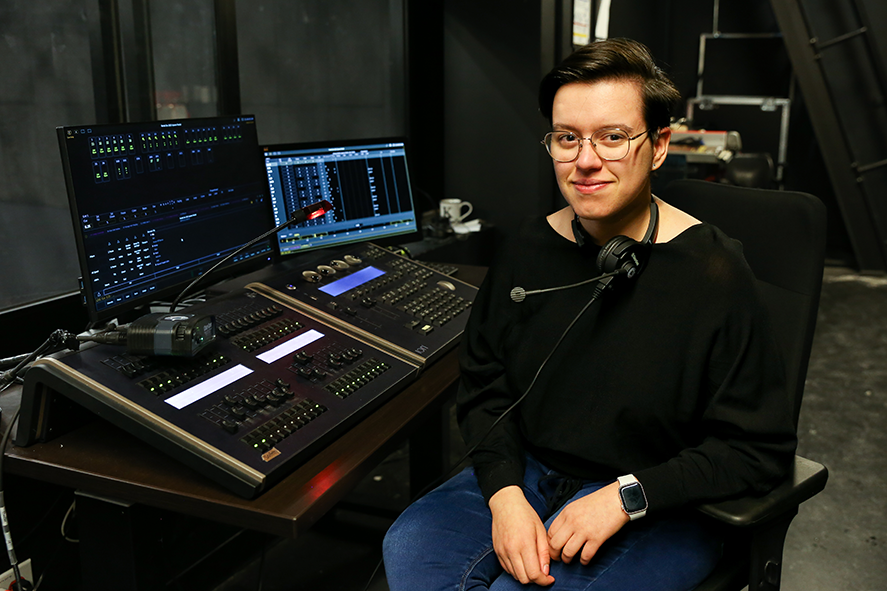A graduate of a francophone high school in Edmonton, Amélie decided to study in Ottawa after she was selected by the House of Commons pages program. This prestigious program offers 40 Ottawa students a dream job: being part of the country’s democratic process by working on Parliament Hill. “I loved my experience,” she says. “I’m continuing to work in Parliament this year as a guide.” In addition to the work experience the pages program offered, the option of doing her four years of university in French led Amélie to choose uOttawa.
Amélie’s passion for theatre isn’t new. In Grade 8, she was part of a theatre company at her school. She was preparing for a youth theatre festival when the pandemic hit. The Franco-Albertan festival invites students from French-language schools to present plays they’ve written and even directed. However, Amélie had to settle for virtual theatre. Not surprisingly, she was therefore very eager to take part in in-person productions at uOttawa.
During Amélie’s years of high school theatre, her hearing problems didn’t interfere with her performance. Since the theatre club only had around 10 students, it was easy for Amélie to hear her colleagues. When it comes to theatre productions at uOttawa, the large scale of the plays makes things more complicated. “There are more actors and technicians, it’s bigger, more professional. We use a lot more technology. It’s not amateur theatre anymore.”
Amélie can hear thanks to her cochlear implants and lip-reading skills. “I had two operations when I was young to add magnets in my head, so that external sounds could reach my brain.” These devices mimic the hairs of our inner ears. When the magnets vibrate, sound is transmitted to the brain and becomes words, speech. It’s a different technology than hearing aids.

“Tina Goralski, production manager, and Jon Lockhart, technical director, worked with me to find accommodations so that I could follow the lighting and sound management”
Amélie Mercier, second-year theatre student at the University of Ottawa
Amélie’s main problem with the control room, the small space at the back of the hall for work on the sound and lighting, is the headphones. “I can’t wear them easily because they’re not fully compatible with my cochlear implants,” she explains. However, they’re essential for the tech team, which uses them in the control room to hear the performers. This communication between centre stage and backstage is crucial for theatre. “Tina Goralski, production manager, and Jon Lockhart, technical director, worked with me to find accommodations so that I could follow the lighting and sound management,” two topics Amélie is particularly interested in. Even if Amélie especially likes to tread the boards, the department offers her training that covers both centre stage and backstage.
Having received so much support from her classmates and professors, Amélie is full of praise for her department, which she’d recommend to anyone interested in the performing arts. “All the theatre professors left their mark on me. They’re fantastic. They’re accommodating, nice. If you need to speak to them, they’re available and approachable.”
This wasn’t the first time that the University had given Amélie a helping hand so she could succeed. Everyone who teaches her wears a Roger On during class. Thanks to this device, which acts as a small mic, Amélie can hear them directly in her ears without having to rely on lip reading. She’s also entitled to more time for her exams and can write them in an isolated space, removed from disturbing sounds. The quiet sounds that aren’t noticeable to us are actually amplified considerably by her devices.
After several attempts and discussions with audiologists, Lockhart announced that a test conducted with Amélie had been a success. “The prototype worked! It’s basically a simple Y cable that divides the audio signal that would normally go to the headphone speakers, and sends it instead to a radio frequency transmitter that delivers the signal directly to Amélie’s cochlear implants. She can still use the same headphone mic and just wear it around her neck. What’s great about this relatively simple solution is that it integrates perfectly into our pre-existing system, and so, Amélie can work in any of our three theatre spaces.”
Whether centre stage or backstage, the Faculty of Arts will continue to find new, ingenious ways to support students who feel — and inspire — passion like Amélie.
